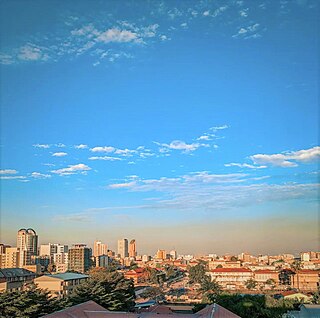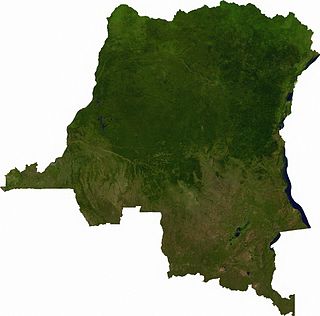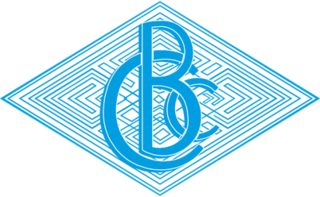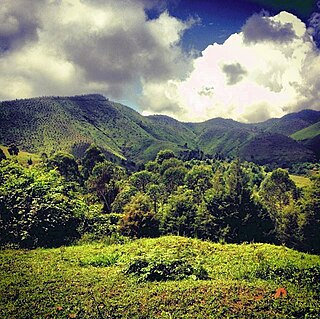The Congolese franc is the currency of the Democratic Republic of the Congo. It is subdivided into 100 centimes. However, centimes no longer have a practical value and are no longer used. In April 2024, 2,800 francs was equivalent to US$1.

The Pentacost Martyrs Stadium, or commonly referred to as the Stade des Martyrs, is the national stadium of the Democratic Republic of the Congo, located in the Kinshasa commune of the capital Kinshasa. With a seating capacity of 80,000, it is the largest stadium in the Democratic Republic of the Congo and the fourth-largest stadium in Africa. It serves as the home stadium for the Congolese football national team, Association Sportive Vita Club, and Daring Club Motema Pembe, making it the largest multifunctional venue in the country.

Gombe, also known as La Gombe, or Downtown Kinshasa, is one of the 24 communes of Kinshasa, in the western part of the Democratic Republic of the Congo. Encompassing a vast area of approximately 29.33 square kilometers, it is home to an approximate population of 49,024 residents (2014).

The Société Commerciale des Transports et des Ports, formerly known as the Office d'Exploitation des Transports Coloniaux 1935–1959, then Office d'Exploitation des Transports au Congo 1960–1970, and Office National des Transports 1971–2011, is a state-owned enterprise headquartered in Kinshasa. The SCTP operates railways, ports, and inland barge transport in the northern and western regions of the Democratic Republic of the Congo, along the Congo River. Established in 1935, its main office is strategically situated on Boulevard Du 30 Juin in the Gombe commune of Kinshasa.

Articles related to the Democratic Republic of the Congo include:

The Central Bank of the Congo, colloquially known by its acronym BCC, is the central bank of the Democratic Republic of the Congo. Its headquarters are located on Boulevard Colonel Tshatshi in Gombe, Kinshasa, surrounded by significant institutions including the Palais de la Nation, the National Library, and several government ministries.
Justin Bitakwira Bihona-Hayi is a Congolese politician and a member of the National Assembly. He is the founder of the Alliance pour la République et la Conscience Nationale political party (ARCN) and a member of the Union for the Congolese Nation. He has been affiliated with several political parties, including the Union for Democracy and Social Progress (UDPS) and the People's Party for Reconstruction and Democracy (PPRD). He held various government positions, including Minister of Rural Development, Minister of Communication and Media and Minister of Relations with Parliament. As a minister, his political principles were described as nationalist, populist, opportunist, reformist, tribalist, and protectionist.

Noël Kabamba Tshiani Muadiamvita is a Congolese economist and politician. He was a presidential candidate in the 2018 and 2023 general elections. In 2021 and 2023, Tshiani proposed a law to restrict various government positions to only individuals who were born to Congolese parents.
Henri-Thomas Lokondo Yoka was a Congolese politician who served as a deputy in the Democratic Republic of the Congo National Assembly from 2011 until his death in 2021. He previously held office as Deputy Minister of Public Works from 1993 until 1994 and Deputy Minister of Foreign Relations from 1996 until 1997. In the 2000s he formed his own party, the Union Congolaise pour la Liberté.

Nicolas Kazadi is a Congolese politician and career diplomat who has been Ambassador-at-large for the Democratic Republic of the Congo since 7 March 2019 and Minister of Finance since 12 April 2021.
Étienne Flaubert Batangu Mpesa was a Congolese pharmacist and scientific researcher.

The Limete Tower is a tower located in the commune of Limete in Kinshasa, the capital city of the Democratic Republic of the Congo.

Gael Bussa Obambule is a Congolese lawyer and politician. He was elected National Deputy in the constituency of Budjala, in the province of South-Ubangi, in the 2018 Democratic Republic of the Congo general election.
The Coupe du Congo is the national cup basketball championship in the Democratic Republic of the Congo. The competitions is played by the top two teams from the regional league in the country. It is the only annual competition organised by the Democratic Republic of Congo Basketball Federation (FEBACO). The cup is organised since 1985.
Tharcisse Kasongo Mwema Yamba-Yamba was a Congolese journalist and politician.

Kilungutwe is a small village in the Luindi Chiefdom, located in the valley of the Kilungutwe River in the Mwenga Territory of the South Kivu Province. Situated in the eastern part of the Democratic Republic of the Congo (DRC), Kilungutwe is positioned nearby neighboring villages of Kirukungutu and Chowe. The region is a melting pot for many ethnic groups, boasting a diverse ethnocultural landscape. It is also a point of confluence for numerous ethnic groups, including the Lega, Nyindu, Shi, Fuliiru, Holoholo, Bwari, Vira, Hunde, Nyanga, Bembe, and Amba people.
The Luindi Chiefdom, also known as the Lwindi Chiefdom, is a chiefdom located in the Mwenga Territory, within the South Kivu Province in the eastern region of the Democratic Republic of the Congo (DRC). It is situated in the mountainous area of the Itombwe Massif.
Ursule Peshanga Mikobi, commonly referred to as Ursule Peshanga, is a Congolese actress, producer, and entrepreneur.
Télé 50 is a private television channel in the Democratic Republic of Congo, broadcasting from the provincial city of Kinshasa. Created in 2010, it is a channel close to former president Joseph Kabila Kabange.











